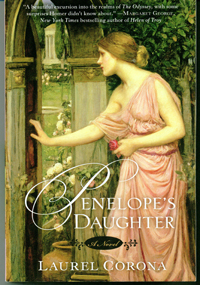Penelope’s Daughter by Laurel Corona, Berkeley Publishing Group, 2010, 358 pages including glossary, afterword and reader’s guide, $15.
By Donald H. Harrison

 SAN DIEGO—Readers may be charmed by this story and yet find it controversial. Prize-winning author Laurel Corona, who often writes book reviews for San Diego Jewish World, has written another novel, Penelope’s Daughter, in which she makes a major amendment to Homer’s Odyssey.
SAN DIEGO—Readers may be charmed by this story and yet find it controversial. Prize-winning author Laurel Corona, who often writes book reviews for San Diego Jewish World, has written another novel, Penelope’s Daughter, in which she makes a major amendment to Homer’s Odyssey.
Corona conjures up a daughter, born to Penelope and Odysseus after the latter has sailed off to war to bring Helen home from Troy. The daughter, Xanthe, growing up without knowing her father, is very much in danger as suitors press their attentions on Penelope (true to Homer’s version). Would one of these avaricious men seeking Odysseus’ throne rape Xanthe to force her into a marriage?
Fearing that one of these louts indeed might use rape as a political weapon, Penelope decides to fake Xanthe’s death and to send her away secretly to Sparta, where her old friend Helen (of Trojan war fame) rules as Menelaus’ queen.In such a way, Corona weaves for us a tale of a young girl growing to womanhood, and eventually falling in love, in two different cities of ancient Greece, while at the same time providing voices for the women who are otherwise silent in Homer’s enduring classic.
The relationship between Xanthe and Helen is especially interesting. Had Helen not run off with Paris, there would have been no need for the Trojan Wars from which (during the major part of Corona’s book) Odysseus had not returned. Yet Helen and Penelope were childhood friends, and Helen was willing to take a disguised Xanthe into her household. So Xanthe found herself both resentful and beholden to the woman whose beauty, according to the Homeric legend, launched 1,000 ships.
Those who may argue that it’s chutzpah for a modern-day author to write a prequel, sequel, or contemporaneous amendment to such a classical piece of literature should realize that Corona has a clear precedent from our own Jewish community.
Do not her fellow Jewish scholars do the same thing when they devise stories—or midrashim—to explain or amplify passages in the Bible?
A professor of humanities at San Diego City College, Corona has the rare capacity of being able to immerse herself in historic cultures and to transmit to her readers the sights, smells and even the tactile sensations of those times. She has a rich imagination, fortified by solid research.
Her last historical novel, The Four Seasons, based on the life of Vivaldi, brought readers into the world of a Venetian priest who also was a musical genius. Like Until Our Last Breath, the history that she co-authored with Michael Bart depicting the lives of Lithuanian Jews during the Holocaust, The Four Seasons won a San Diego book award.
This book, though it may raise some hackles, seems likely to win more laurels for Laurel.
*
Harrison is editor of San Diego Jewish World